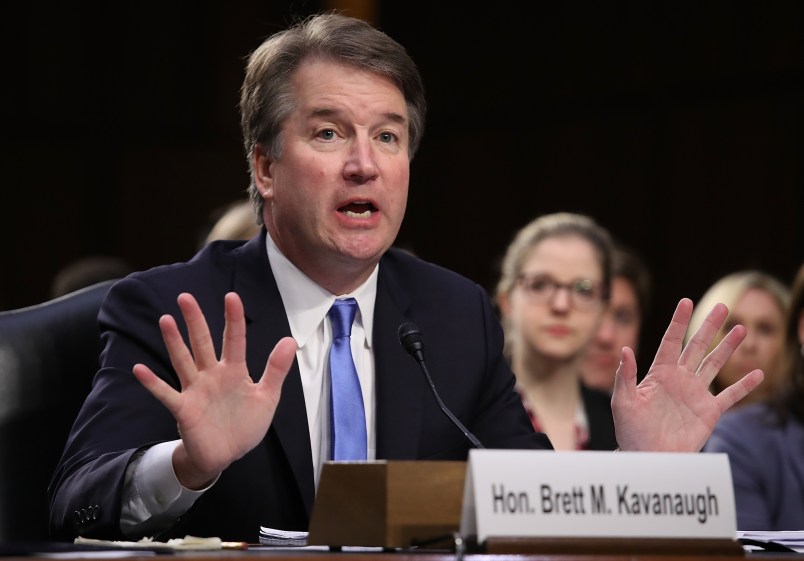TPM Reader SC says the failure of the Kavanaugh nomination, if it happens, could end any Democratic hopes of taking the Senate and possibly do the same for the House. Here’s his take and then my thoughts afterwards …
To your point about the evangelical right’s willingness to do anything to seat Kavanaugh, with the recent allegations stalling his momentum, I believe the calculus is more complex than the Democrats anticipate. If Kavanaugh is not confirmed (either due to delay or withdrawal) Democrats lose any chance of retaking the Senate. Nothing, literally nothing motivates the GOP base, particularly in places like IN, TN, ND, like outlawing abortion. Deny them their hope to do so and they will turn out such that I suspect Democrats don’t take either body of Congress.
First let’s set aside the substantive questions surrounding the accusation against Kavanaugh. Politics are obviously not the only and not the most important issues at stake here. I don’t think SC is saying that. But I wanted to consider this electoral question on its own terms.
I’m actually pretty skeptical that what SC says is the case, certainly for the House.
First, there’s a long history of political prognosticators overestimating the impact of evangelical voters and specifically their turnout capacity in specific situations. I’m reminded of the 1998 midterm 20 years ago. Republicans were planning to impeach Bill Clinton. They anticipated that the impeachment saga could net them dozens of new seats in the House. Alternatively, not impeaching Clinton could lead to a massive drop off in support from these key GOP voters. These assumptions were widely held among political pundit as well.
The problem was that polls showed impeachment was extremely unpopular and that Democrats might actually pick up seats. Public polls were actually quite consistent on this point. Yet no one believed them because there was a consensus that those polls were not picking up the enthusiasm and determination of these evangelical voters. In the event, Republicans actually did lose a small number of seats. People’s assumptions about these voters, on both sides of the aisle, were so set in stone they ignored a lot of evidence saying this simply wasn’t true.
It is certainly true that the courts and particularly abortion run far deeper in rightwing evangelical politics than Bill Clinton, though we shouldn’t understate just how deep opposition to him ran.
What does this tell us about this cycle?
I don’t accept the premise that the voters in question are really that far below peak mobilization already. In other words, I’m skeptical that there’s that much more energized they can get. Of course, that’s not the only pool of voters in play. There has been a huge amount of mobilization already about Trump and Kavanaugh and particularly abortion rights among voters on the other side of the ledger. To date that has been sustained around the extremely long odds against Kavanaugh being defeated. The idea that the midterms could determine who gets that Anthony Kennedy’s seat I think can have a huge amount of impact on the Democratic side too.
There’s still another calculation to consider. I think this holds open a potential and very real opportunity for endangered Democratic senators in red states: namely, that they won’t have to vote on Kavanaugh at all and if they do that they’ll have a strong affirmative reason for doing so. You can argue about how voters might be motivated to vote with a mind to a hypothetical second nominee for this seat. But for this election and this seat, running ads against red state Democrats praising Kavanaugh’s virtues is going to get much more complicated and less effective. All of this of course fails to take into account the less direct and literal effect of fairly massive demoralization of Republican voters if Kavanaugh’s nomination goes down in flames.
Of course, electoral politics aren’t the only or most important calculus in this situation. But I’m skeptical that this really puts red state Democrats in a difficult position or at least a more difficult position than they were already in, which is considerable. They were all faced with a very difficult political choice. This holds out the real possibly they’ll never have to make that choice or that they’ll face it with an affirmative argument they are more confident making to voters in their states.
What do you think?






